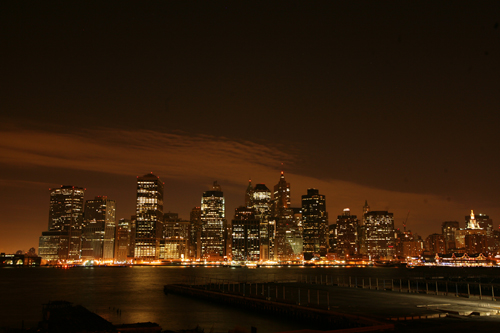
In college, when our money got thin, my roommate instituted what he called "freezing in the dark." The thermostat was dialed down, the lights went out, and the utility bill plunged. I can't say I always enjoyed it. At times I imagined we could store frozen hamburger on our bookshelves, and our shins were bruised from knocking into things at night. But despite my roommate's unrelated and unforgivable policies of rarely wearing pants and smelling like old curry, he got a clap on the back when the utility bill showed up.
Facing a projected $4 billion gap in New York City's 2009 and 2010 budgets, Mayor Michael Bloomberg is also looking for ways to save a few bucks. He's laying off city workers, increasing parking fees, and canceling January's police academy. Turning down the heat might not be in the cards, but has he considered turning off the lights?
Take a midnight stroll around City Hall and it looks like somebody is shooting a movie in there--using a daylight effect. Perhaps a few city workers are up late looking for extra credit, but most city-run buildings look like any other skyscraper in the dead of night: empty and bright. Few data are available about how many lights stay on through the night, but that's part of the problem; without systems designed to monitor usage, there's little hope for reining it in.

What we do know is that lighting is responsible for nearly a quarter of the energy use across the city. Fortunately, the mayor's long term plan for the city - as articulated in his plaNYC 2030 proposals - include retrofitting city-run buildings to curb electricity use. Daylight dimming controls and motion-sensor lights will keep lights low or off when they are not needed, and the city will continually invest an amount equal to 10% of its annual energy budget in energy-saving technologies.
But with today's budget shortfalls, few of these technological fixes are likely to come soon. And although Bloomberg and other mayors are rightly lauded for thinking long-term during a period of presidential short-sightedness, there can be a tendency to over-emphasize technology and under-emphasize mindset. The city needs to start saving money now, and there's an easy way to do it: Bloomberg should ask city employees and cleaning crews to shut off lights when they leave work. Building a greener infrastructure is important, but greening the hearts and minds of New Yorkers will ensure that the infrastructure works.
Perhaps because light doesn't make a sound when it trickles from the light bulb, we tend to be less light-conscious than water-conscious. But light, like water, is a limited resource; it's generated using fossil fuels. Leaving the lights on all night is like leaving a tap running in an empty bathroom -- millions of photon taps, all across the city, kept flowing by the steady burning of coal and oil. Nationwide, it's estimated by the International Dark Sky Association that upwards of $1.5 billion is spent every year on wasted light --mostly light that heads upwards into outer space from poorly designed streetlights or building lights.
Given that the city government spends nearly $800 million every year on its overall energy bill, the financial incentive here is clear. With thousands of homeless New Yorkers actually outside freezing in the dark, using tax dollars to heat and illuminate empty rooms is absurd, if not immoral. If the mayor wants the city to get behind plaNYC, he will need the people of NYC to get behind it--and it's natural to begin setting an example with city tax dollars.
Like many New Yorkers, I don't control the heat in my rented apartment; when the radiators crank too high, I yank the windows open. But I do control the lights, and the electricity bill is a monthly reminder of why I should keep things dark. Well, not exactly dark: if I want to read a book before bed, there's plenty of light pouring through my windows from the streetlights outside--courtesy of a few tax dollars in the city that never sleeps.